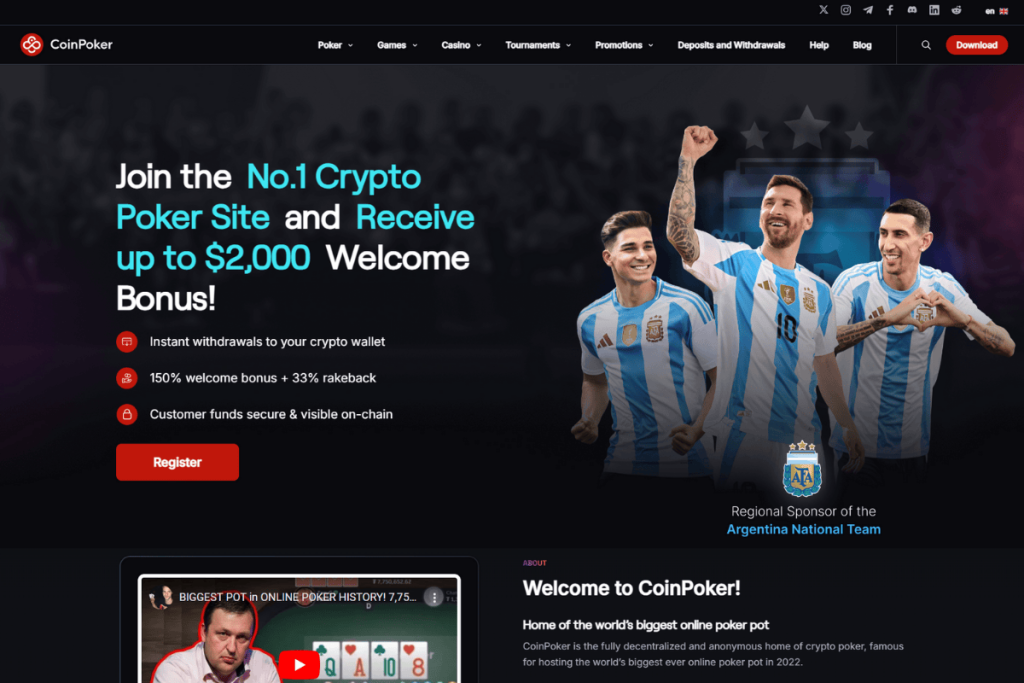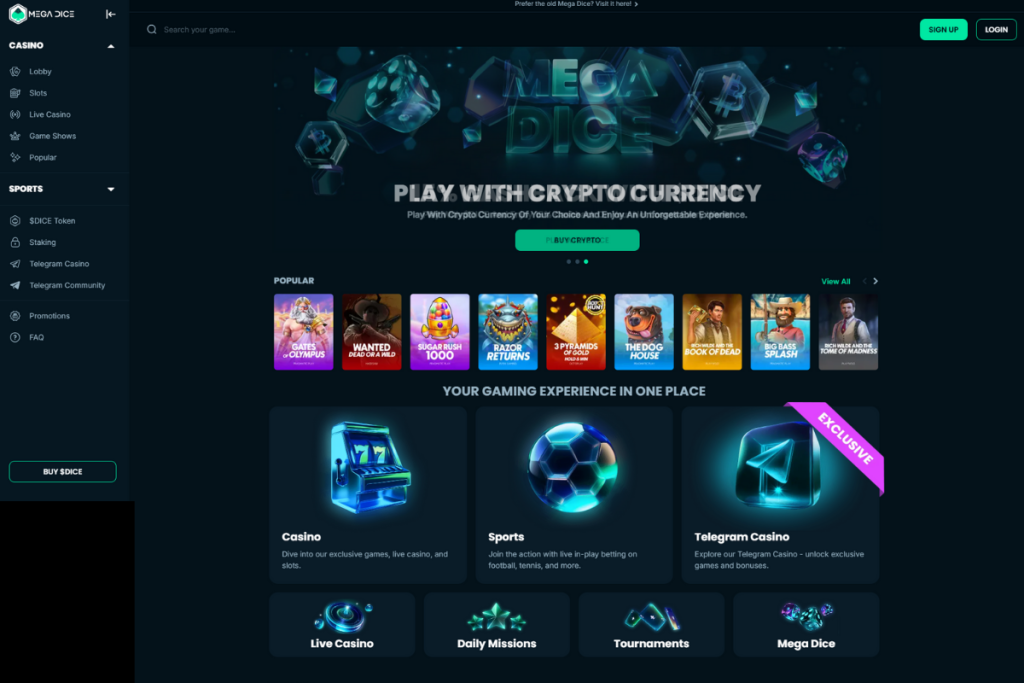Online casino v Sloveniji so vse bolj priljubljeni, saj ponujajo udobno in vznemirljivo izkušnjo igranja iz domačega naslanjača. S številnimi licenciranimi platformami imajo igralci dostop do širokega spektra iger, vključno s spletni sloti, namiznimi igrami in igrami v živo. Poleg tega ponujajo privlačne bonuse, kot so brezplačni vrtljaji in VIP programi. Pri izbiri igralnice je ključnega pomena varnost, licenca in zanesljive plačilne možnosti, kar zagotavlja zaščito in pravično igro.
Bonus 1.000 EUR in 100 brezplačnih vrtljajev
Bonus 1.000 EUR in 100 brezplačnih vrtljajev
200 % bonus dobrodošlice do 7.500 $ + 10 % povračila denarja
200 % bonus dobrodošlice do 7.500 $ + 10 % povračila denarja
200 % opptil 300 000 kr
200 % opptil 300 000 kr
200 % bonus dobrodošlice do 5.000 $ + 50 brezplačnih vrtljajev
200 % bonus dobrodošlice do 5.000 $ + 50 brezplačnih vrtljajev
150 % bonus na polog do 2.000 $
150 % bonus na polog do 2.000 $
200 % do 5.000 € + 10 % TEDENSKO POVRAČILO DENARJA
200 % do 5.000 € + 10 % TEDENSKO POVRAČILO DENARJA
200 % bonus dobrodošlice do 25.000 $ + 50 brezplačnih vrtljajev
200 % bonus dobrodošlice do 25.000 $ + 50 brezplačnih vrtljajev
200 % do 5.000 € + 10 % tedenskega vračila denarja
200 % do 5.000 € + 10 % tedenskega vračila denarja
200 % do 5.000 € + 50 brezplačnih vrtljajev + 10 % tedenskega vračila denarja
200 % do 5.000 € + 50 brezplačnih vrtljajev + 10 % tedenskega vračila denarja
Leto 2026 prinaša še večjo izbiro in inovacije v svetu Online Casino, ki so v Sloveniji vse bolj priljubljeni. Spletne igralnice so se razvile v prostor, kjer igralci iščejo ne samo zabavo, temveč tudi varnost, hitre izplačljive nagrade in odlične bonuse.
V tem pregledu bomo predstavili najboljše spletne casinoje v Sloveniji za leto 2026, ki vam zagotavljajo kakovostno in varno igranje ter vrhunske pogoje za uživanje v svojih najljubših igrah.
V nadaljevanju bomo predstavili izbor za najboljši Online Casino Slovenija, njihove glavne značilnosti, bonuse dobrodošlice in njihovo ponudbo.
Instant Casino je spletna igralnica, ki ponuja brezskrbno in intuitivno igralno izkušnjo, primerna za igralce vseh nivojev. S hitrim postopkom registracije in takojšnjimi izplačili je postala priljubljena izbira med slovenskimi igralci.

Online casino se ponaša s široko izbiro iger, vključno z vrhunskimi igralnimi avtomati, klasičnimi igrami v živo, kot so ruleta, blackjack in baccarat, ter edinstvenimi naslovi, ki jih ponujajo priznani razvijalci iger, kot so Pragmatic Play, Hacksaw in Evolution Gaming.
Instant Casino nove igralce pričaka z izjemno radodarnim bonusom dobrodošlice, ki poskrbi za odličen začetek igralne poti in več zabave že od prvih vrtljajev. Poleg tega platforma vsak teden ponuja do 10 % cashback vračila denarja, kar zmanjšuje tveganje in omogoča bolj sproščeno igranje. Prav tako so na voljo posebne promocije za športne stave, kjer lahko igralci prejmejo do 40 % dodatka na zmagovalne listke, kar prinaša še večjo vrednost pri vsakem uspešno oddanem stavnem listku.
Igralnica je oblikovana z osredotočenostjo na preprostost in odlično uporabniško izkušnjo. Ponuja enostavno navigacijo, hiter dostop do priljubljenih iger ter preproste plačilne možnosti, med katerimi izstopata Visa in Mastercard.
Prednosti:
Slabosti:
Lucky Block je napreden spletni casino, ki ponuja izjemno uporabniško izkušnjo in široko izbiro iger, hkrati pa je posebej prijazen do uporabnikov kriptovalut. S svojo ogromno izbiro več kot 4.000 iger, vključno z igralnimi avtomati, različnimi različicami klasičnih namiznih iger ter igralnico v živo, Lucky Block izstopa v svetu spletnih igralnic.

Poleg tega Lucky Block izstopa tudi po svojih hitrih transakcijah in podpori za več kot 20 kriptovalut, kot so Bitcoin, Ethereum in Litecoin, kar omogoča enostavne in varne vloge ter dvige. Igralci, ki se odločijo za Lucky Block, lahko uživajo v različnih bonusih, vključno z bonusom dobrodošlice, ki nudi 200 % bonus do 25.000 € ter 50 brezplačnih vrtljajev.
Prednosti:
Slabosti:
Lucky Block je idealna izbira za tiste, ki iščejo inovativno spletno igralnico z obsežno izbiro iger in možnostmi za hitro transakcijo.
Golden Panda je spletna igralnica, ki ponuja več kot 3.000 iger, vključno z igralnimi avtomati, namiznimi igrami in naprednimi igrami v živo. S sodelovanjem z vodilnimi ponudniki, kot sta Evolution Gaming in Pragmatic Play, igralci uživajo v priljubljenih naslovih, kot so Mega Joker in Rise of the Mighty God. Na voljo so tudi inovativne igre v živo, kot je Sweet Bonanza Candyland.

Igralnica sprejema tradicionalne plačilne metode in kriptovalute (Bitcoin, Litecoin, Ethereum), kar omogoča hitro in varno transakcijsko izkušnjo. Novi igralci lahko izkoristijo bonus dobrodošlice do 7.500 €, medtem ko tedensko povračilo denarja brez stavnih zahtev nudi dodatno varnost.
Prednosti:
Slabosti:
CoinPoker je spletna poker platforma, ki združuje poker igre z naprednimi kriptovalutnimi možnostmi. Igralcem omogoča sodelovanje v različnih različicah pokra, vključno s Texas Hold’em, Omaha in Omaha s petimi kartami, z različnimi stavnimi razponi, kar zadostuje tako priložnostnim igralcem kot tudi visokostavnim navdušencem.

Ena od ključnih prednosti CoinPokerja je njegova integracija s kriptovalutami, kot so Bitcoin (BTC), Ethereum (ETH), Tether (USDT) in lastni žeton CHP. Ta pristop omogoča hitre in varne transakcije z nizkimi provizijami ter zagotavlja visoko stopnjo varnosti in anonimnosti za igralce.
Platforma uporablja decentraliziran generator naključnih števil (RNG), ki omogoča igralcem, da preverijo poštenost, kar povečuje preglednost in zaupanje v igro. Poleg tega CoinPoker ponuja mobilno aplikacijo za naprave iOS in Android, kar igralcem omogoča, da uživajo v igrah na poti.
Prednosti:
Slabosti:
TG.Casino je moderna spletna igralnica, ki ponuja edinstveno igralno izkušnjo preko integracije s Telegram aplikacijo. Ta inovativni pristop omogoča hiter dostop do več kot 2.000 iger. Poleg tega platforma ponuja širok spekter športnih stav, vključno z možnostmi za stave v živo, kar omogoča dodatno dinamiko igranja.

Ena glavnih prednosti TG.Casino je njegova osredotočenost na kriptovalute. Sprejema številne priljubljene kriptovalute, kot so Bitcoin, Ethereum, Tether, Litecoin in druge, kar omogoča hitro in varno izvedbo transakcij. Za igralce, ki želijo anonimnost, platforma zagotavlja brezskrbno igranje, saj ni potreben noben postopek preverjanja identitete. To pomeni, da lahko igralci uživajo v svojih igrah, ne da bi morali razkrivati svoje osebne podatke, kar zagotavlja dodatno varnost in zasebnost.
TG.Casino ne ponuja le široke izbire iger, temveč tudi možnost sodelovanja v skupnosti preko Telegrama. Igralci se lahko povežejo z drugimi igralci in klepetajo med igranjem, kar dodaja družabni element in povečuje interaktivnost. Poleg tega je platforma licencirana s strani Curacao, kar zagotavlja pošteno in pregledno igranje.
Prednosti:
Slabosti:
Mega Dice je sodobna spletna igralnica, ki združuje široko izbiro iger z inovativnimi plačilnimi možnostmi. Povezava z aplikacijo Telegram omogoča enostaven dostop do iger in športnih stav, kar povečuje priročnost za igralce.

Igralnica je licencirana na Curacau, kar zagotavlja skladnost z mednarodnimi predpisi o igrah na srečo. Mega Dice se osredotoča na hitro in varno obdelavo transakcij s kriptovalutami, kar omogoča takojšnje depozite in dvige brez zamud. Pomanjkanje obveznega postopka KYC v mnogih primerih dodatno ščiti zasebnost igralcev.
Poleg tega Mega Dice ponuja različne promocije, vključno z velikodušnim bonusom dobrodošlice, ki vključuje 200 % ujemanje prvega depozita do 1 BTC in 50 brezplačnih vrtljajev. Za zveste igralce je na voljo VIP program z ekskluzivnimi ugodnostmi, kar spodbuja dolgoročno zvestobo.
Prednosti:
Slabosti:
Wall St Memes Casino je sodobna spletna igralnica, ki se osredotoča na kriptovalute, ponuja pa širok spekter iger, vključno z več kot 5.000 igralnimi avtomati, namiznimi igrami in naprednimi igrami v živo. Platforma omogoča enostavno uporabo priljubljenih kriptovalut, kot so Bitcoin, Ethereum in Dogecoin, kar zagotavlja hitro in varno obdelavo transakcij. Z uporabo naprednih varnostnih ukrepov omogoča igralcem anonimnost, kar je privlačno za tiste, ki cenijo zasebnost.

Igralci se lahko veselijo velikodušnega bonusnega paketa, ki vključuje 200 % ujemanje prvega depozita do 25.000 € in brezplačne vrtljaje. Platforma se ponaša z VIP programom ter tedenskim cashbackom, ki omogoča povračilo izgubljenega denarja. Poleg tega Wall St Memes Casino ponuja širok spekter iger v živo in e-športnih stav, kar omogoča igralcem dinamično izkušnjo, polno možnosti za zabavo.
Prednosti:
Slabosti:
Mostbet je celovita spletna platforma, ki združuje športne stave in igralniške igre, kar omogoča igralcem široko izbiro zabave na enem mestu. Z intuitivnim vmesnikom in obsežno ponudbo športov, kot so nogomet, košarka, tenis, kriket ter nišnimi možnostmi, kot sta boks in pikado, platforma zadostuje različnim interesom.
Poleg tega Mostbet ponuja široko paleto igralniških iger, vključno z igralnimi avtomati, ruleto, blackjackom ter priljubljenimi igrami, kot sta Aviator in različne “crash” igre. Sekcija iger z delivci v živo omogoča realistično igralno izkušnjo s profesionalnimi delivci, kar še dodatno izboljša uporabniško izkušnjo.
Kar zadeva plačila, Mostbet podpira približno 100 različnih možnosti, ki se prilagodijo glede na igralčevo lokacijo. Med njimi so priljubljeni načini, kot sta Visa in Mastercard, elektronske denarnice, kot je Payz, ter številne kriptovalute. To zagotavlja hitro in varno obdelavo transakcij ter zadovoljstvo uporabnikov.
Prednosti:
Slabosti:
Sportaza je sodobna spletna platforma za športne stave in igralniške igre, ki deluje pod licenco Curacao in jo upravlja podjetje Rabidi N.V. Ponuja širok spekter zabave z več kot 5.300 igrami, ki jih zagotavljajo priznani razvijalci, kot so Play’n GO, NetEnt, Yggdrasil in Evolution Gaming. Med priljubljenimi naslovi so igralni avtomati, kot sta Gems Bonanza in Power of Thor Megaways, ter igre v živo, kot sta Lightning Blackjack in Mega Ball 100x.
Platforma omogoča enostavno in varno plačevanje z različnimi metodami, vključno s kreditnimi karticami, elektronskimi denarnicami, kot sta MiFinity in Stic Pay, ter priljubljenimi kriptovalutami, kot so Bitcoin, Ethereum in Litecoin. Intuitivna in mobilno optimizirana platforma zagotavlja enostaven dostop do vseh funkcionalnosti, podpora strankam pa je na voljo 24/7.
Prednosti:
Slabosti:
Betsamigo je spletna igralnica, ki deluje pod licenco Malta Gaming Authority in jo upravlja podjetje L.C.S Limited. Ponuja široko izbiro iger, vključno z igralnimi avtomati, namiznimi igrami in igrami v živo, ki jih zagotavljajo priznani ponudniki programske opreme, kot so Play’n GO, NetEnt in Evolution Gaming. Igralci lahko uživajo v priljubljenih naslovih, kot so “Book of Dead”, “Starburst” in “Gonzo’s Quest”. Sekcija z igrami v živo ponuja več kot 400 miz, kar zagotavlja realistično igralno izkušnjo.
Poleg tega Betsamigo omogoča različne plačilne metode, vključno z Visa, Mastercard, Neteller, Skrill, Ecopayz, Paysafecard, Rapid Transfer, MiFinity, CASHlib, AstroPay, Neosurf in Direct Bank Transfer. Minimalna starost za igranje je 18 let.
Prednosti:
Slabosti:
Spletni casinoji ponujajo različne vrste bonusov, ki igralcem omogočajo večje možnosti za zmago, zmanjšujejo tveganje in izboljšajo splošno izkušnjo igranja. Casino bonusi so odličen način, da začnete z igrami brez večjih začetnih vložkov, ali pa povečate svoje možnosti za dobitke z dodatnimi nagradami. V nadaljevanju si bomo ogledali najpogostejše vrste bonusov, ki jih ponujajo najboljši slovenski online casino.
Bonus za cashback
Bonus za cashback omogoča povračilo dela izgubljenega denarja, običajno v obliki odstotka izgube. Ta pomaga igralcem zmanjšati izgube in podaljša igranje brez dodatnega depozita.
Bonus za povečane kvote
Ta bonus omogoča povečanje kvot na športne stave, kar povečuje potencialne dobitke pri večjih tveganjih. Pogosto se ponuja ob večjih športnih dogodkih ali promocijah.
Brezplačni vrtljaji
Brezplačni spini omogočajo igralcem, da vrtijo igralne avtomate brezplačno, običajno kot del promocij, kar povečuje možnosti za dobitke brez tveganja lastnega denarja.
Bonus brez pologa
Bonus brez pologa omogoča igralcem, da preizkusijo igre brez začetnega depozita. Običajno gre za manjše bonuse ali brezplačne vrtljaje, vendar so odlična priložnost za brezskrbno igranje.
Brezplačna stava
Brezplačna stava omogoča igralcem, da stavijo brez tveganja lastnega denarja. Če stava izgubi, ne izgubljajo denarja, medtem ko morebitni dobički pripadajo njim. Pogosto jo je mogoče uporabiti pri najbolj priljubljenih športih, kot sta stavljenje na nogomet ali košarko.
Bonus za vplačilo
Bonus za vplačilo ponuja določen odstotek prvega depozita, s čimer igralcem povečuje začetni bankroll in omogoča daljše igranje.
Programi zvestobe/VIP programi
Ti programi nagrajujejo redne igralce z različnimi nagradami, kot so bonuski, brezplačni vrtljaji in ekskluzivne promocije, odvisno od stopnje zvestobe.
Bonus dobrodošlice
Bonus dobrodošlice vključuje kombinacijo bonusov na prvi depozit in brezplačnih vrtljajev, ki igralcem omogočajo večje možnosti za začetek igre brez večjega tveganja.
Začetek igranja v spletnih casinojih v Sloveniji je preprost, vendar je ključnega pomena, da se pred tem seznanite s temeljnimi koraki, ki zagotavljajo varno in prijetno izkušnjo.
Najboljše spletne igralnice brez prenosa ponujajo širok spekter online casino iger in privlačnih bonusov, vendar je pomembno, da izberete zanesljiv casino, registrirate svoj račun ter odgovorno upravljate svoje igre in sredstva.
Pri izbiri spletnih casinojev je pomembno upoštevati različne dejavnike, med katerimi so stavne zahteve in čas izplačila ključni za udobno in učinkovito igranje. Stavne zahteve določajo, koliko morate staviti, preden lahko dvignete bonus ali dobitke, medtem ko čas izplačila vpliva na hitrost, s katero prejmete svoje nagrade.
V nadaljevanju si oglejte tabelo, ki prikazuje stavne zahteve in čas izplačila za različne priljubljene spletne casinoje. To vam bo pomagalo pri izbiri najboljšega casinoja, ki ustreza vašim potrebam in željam.
| Casino | Stavne zahteve | Čas izplačila |
| Instant Casino | 15x za sprostitev bonusa (25% vsakokrat); brez stavne zahteve na cashback | Takojšnje |
| Lucky Block | 6x za sprostitev bonusa v višini 10% | Takojšnje |
| Golden Panda | 15x za sprostitev bonusa (25% vsakokrat); brez stavne zahteve na cashback | 0-1 ure |
| CoinPoker | Za sprostitev bonusa ustvarite rake v višini 2x bonusa | 0-48 ur |
| TG.Casino | Zahteve za stavljenje: vsak 6x vašega začetnega depozita sprosti 10% bonusa | 0-24 ur |
| Mega Dice | 6x za sprostitev bonusa (10% vsakokrat) | Takojšnje |
| WSM Casino | 60x/75x stave; 6x za sprostitev 10% bonusa; 35x za dobitke brezplačnih vrtljajev | 0-1 ure |
| Mostbet | Pri stavah ACCA s 3 ali več napovedmi je stavna zahteva 5x | 0-24 ur |
| Sportaza | Stavna zahteva 35x za začetni depozit, 40x za brezplačne vrtljaje | 0-24 ur |
| BetsAmigo | Stavna zahteva 30x začetnega depozita | 0-24 ur |
Zaščita zasebnosti pri igranju v spletnih casinojih je ključnega pomena. Tukaj je nekaj ključnih nasvetov:
Spletne igralnice v Sloveniji so v zadnjih letih postale priljubljena izbira za ljubitelje spletnega igranja, saj ponujajo širok spekter iger in različnih možnosti za zabavo. Od igralnih avtomatov, namiznih iger do iger v živo, so možnosti skoraj neskončne, kar omogoča vsakemu igralcu, da najde nekaj, kar ustreza njegovim željam. Hkrati pa se vedno več igralnic odloča za vključitev različnih plačilnih metod, vključno s kriptovalutami, kar omogoča večjo fleksibilnost pri vplačilih in izplačilih.
Vendar pa pri izbiri najboljše spletne igralnice ni pomembna le ponudba iger, ampak tudi varnost, hitrost transakcij in kakovost podpore uporabnikom. Pomembno je, da igralci izberejo zaupanja vredne in licencirane platforme, ki zagotavljajo zaščito osebnih podatkov ter poštenost iger. Slovenija ponuja različne možnosti za igralce, ki iščejo zabavo in možnost za dobiček, vendar je ključno, da igralci vedno preverijo pogoje bonusov, možnosti za izplačila in splošno uporabniško izkušnjo, da bi zagotovili najboljšo možno igralniško izkušnjo.
Izberite licencirane in preverjene igralnice, uporabljajte varne plačilne metode (e-denarnice, kripto), poskrbite za močna gesla in 2FA ter si nastavite osebne omejitve za odgovorno igranje.
Da, vse spletne igralnice z licenco, ki delujejo v Sloveniji, so varne za uporabo. Te platforme morajo slediti strogim predpisom, ki zagotavljajo zaščito osebnih podatkov in pravično igranje za vse igralce.
Izberite licencirano igralnico, ustvarite račun, preverite bonus ponudbe, izberite želeno plačilno metodo, in začnite igrati na igralnih avtomatih, ruleti ali stavah v živo.
Casinoji pogosto ponujajo bonuse dobrodošlice, brezplačni vrtljaji in brezplačne stave. Preverite tudi VIP programe in redne promocije za zveste igralce.
Da, večina najboljših spletnih casinojev v Sloveniji je popolnoma prilagojena za mobilne naprave. Igralci lahko brez težav dostopajo do iger prek mobilnega brskalnika ali namenske aplikacije, ne glede na to, ali uporabljajo Android ali iOS.